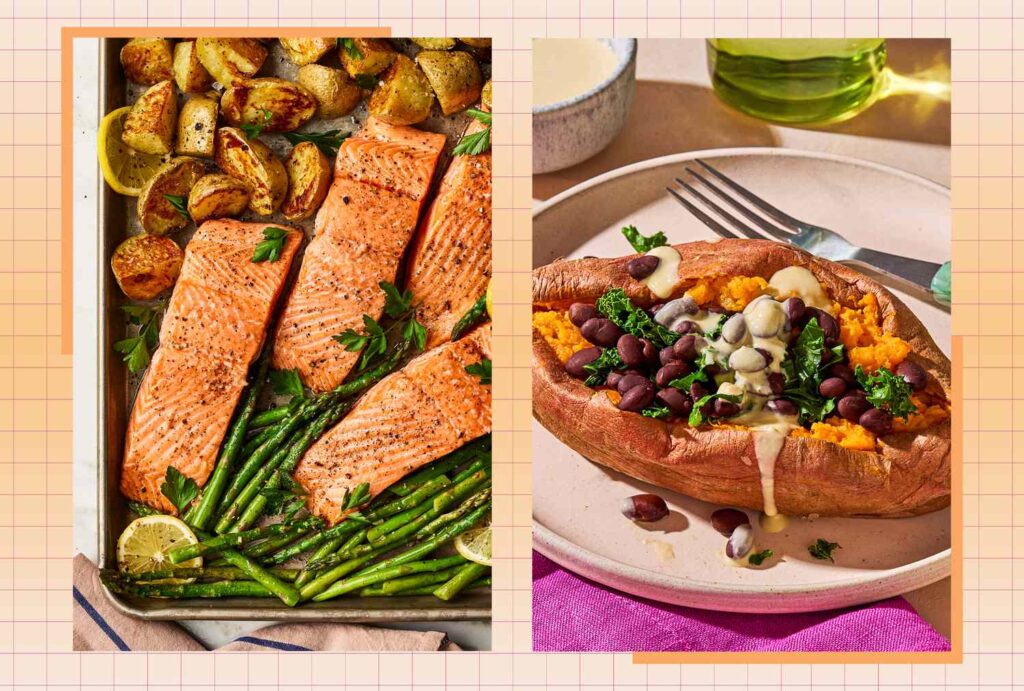| Meal Plan at a Glance | ||
|---|---|---|
| Breakfast/ A.M. Snack | Lunch/ P.M Snack | Dinner/ Evening Snack |
| Apple & nut butter toast | Chickpea & feta grain bowl/ Cottage cheese snack jar | Mediterranean diet stew/ Yogurt parfait |
| Berry chia pudding/ Almonds | Chickpea & feta grain bowl/ Guacamole snack jar | Chicken & sweet potato salad |
| Almond & nut butter toast | Mediterranean diet stew/ Guacamole snack jar | Garlic-butter salmon & veggies/ Yogurt parfait |
| Berry chia pudding/ Almonds | Chickpea & feta grain bowl/ Cottage cheese snack jar | Chicken & sweet potato salad |
| Berry chia pudding | Hummus-stuffed sweet potato/ Guacamole snack jar | Garlic-butter salmon & veggies/ Yogurt parfait |
Day 1
Photographer: Jake Sternquist, Food Stylist: Shannon Goforth, Prop Stylist: Breanna Ghazali.
Breakfast (588 Calories)
Lunch (538 Calories)
Afternoon Snack (219 Calories)
Dinner (231 Calories)
Evening Snack (301 Calories)
Daily totals: 1,854 calories, 77 g fat, 83 g protein, 201 g carbohydrates, 45 g fiber, 1,478 mg sodium
To make it 1,500 calories: Omit evening snack.
To make it 2,000 calories: Add ¾ cup in-shell edamame as a morning snack. Add 1 slice whole-wheat toast to dinner.
Day 2
Photographer: Morgan Hunt Glaze, Prop Stylist: Abby Armstrong, Food Stylist: Margaret Monroe Dickey
Breakfast (478 Calories)
Morning Snack (206 Calories)
- ¼ cup unsalted dry-roasted almonds
Lunch (538 Calories)
Afternoon Snack (168 Calories)
Dinner (584 Calories)
Daily totals: 1,839 calories, 100 g fat, 81 g protein, 173 g carbohydrates, 45 g fiber, 1,375 mg sodium
To make it 1,500 calories: Reduce to 1 tablespoon almonds at morning snack. Omit afternoon snack.
To make it 2,000 calories: Add 1 oz. dark chocolate as an evening snack.
Day 3
Photographer Victor Protasio, Food Stylist Margaret Dickey, Prop Stylist Lydia Pursell
Breakfast (588 Calories)
Lunch (231 Calories)
Afternoon Snack (168 Calories)
Dinner ( 522 Calories)
Evening Snack (301 Calories)
Daily totals: 1,809 calories, 96 g fat, 86 g protein, 154 g carbohydrates, 35 g fiber, 1,635 mg sodium
To make it 1,500 calories: Omit evening snack.
To make it 2,000 calories: Add ½ whole-wheat grilled cheese sandwich to lunch and add ½ serving whole-wheat crackers to afternoon snack.
Day 4
Breakfast (478 Calories)
Morning Snack (103 Calories)
- 2 Tbsp. unsalted dry-roasted almonds
Lunch (538 Calories)
Afternoon Snack (219 Calories)
Dinner (584 Calories)
Daily totals: 1,787 calories, 83 g fat, 93 g protein, 184 g carbohydrates, 44 g fiber, 1,417 mg sodium
To make it 1,500 calories: Reduce morning snack to 1 Tbsp. almonds. Omit afternoon snack.
To make it 2,000 calories: Increase morning snack to 3 Tbsp. almonds. Add 1 oz. dark chocolate as an evening snack.
Day 5
Ali Redmond
Breakfast (478 Calories)
Lunch (472 Calories)
Afternoon Snack (168 Calories)
Dinner ( 522 Calories)
Evening Snack (301 Calories)
Daily totals: 1,806 calories, 81 g fat, 87g protein, 195 g carbohydrates, 51 g fiber, 1,275 mg sodium
To make it 1,500 calories: Omit evening snack.
To make it 2,000 calories: Add 2 Tbsp. unsalted dry-roasted almonds as a morning snack. Add 1 serving whole-wheat crackers to afternoon snack.
Frequently Asked Questions
-
Is it OK to mix and match meals if there’s one I don’t like?Yes! This meal plan is meant to serve as inspiration. It doesn’t need to be followed exactly to reap the benefits. When choosing recipes, we made sure to check the calories, fiber, protein and sodium to align with the parameters of this plan and be within our sodium limits. If you’re making a recipe swap, it may be helpful to choose a recipe with similar calories, fiber, protein and sodium levels. For more inspiration, check out these delicious easy Mediterranean Diet recipes.
-
Can I eat the same breakfast or lunch every day?Definitely, it’s fine to eat the same breakfast or lunch every day. The breakfasts range from 478 to 588 calories, while the lunches span 231 to 538 calories. These ranges are fairly close, though if you’re closely monitoring your calories or other nutrients, like protein, you may want to adjust a snack or two.
-
Why is there not a 1,200-calorie modification?We no longer provide modifications for 1,200-calorie days in our meal plans. The 2020-2025 Dietary Guidelines for Americans suggests that limiting calories to 1,200 per day is too low for most people to meet their nutritional needs, plus it’s unsustainable for long-term health and well-being.
Health Benefits of the Mediterranean Diet
The Mediterranean diet is one of the most well-studied eating patterns in the world, with research showing it can help lower the risk of heart disease, obesity, type 2 diabetes, certain cancers and even neurodegenerative diseases like Alzheimer’s. Much of its power comes from polyphenols and antioxidants naturally found in plant-based foods, which have strong anti-inflammatory properties. By reducing chronic inflammation, this way of eating supports overall health and longevity.
Beyond physical health, promising research suggests the Mediterranean diet may also boost brain health. Studies link it to improved memory, reduced risk of cognitive decline and even better mood regulation, making it as good for your mind as it is for your body. The best part? This style of eating is approachable for beginners. Many of your favorite foods already fit the plan, making it easy to get started.
How We Create Meal Plans
Registered dietitians thoughtfully create EatingWell’s meal plans to be easy-to-follow and delicious. Each meal plan meets specific parameters depending on the health condition and/or lifestyle goal it is targeting and is analyzed for accuracy using the nutrition database, ESHA Food Processor. As nutritional needs differ from person to person, we encourage you to use these plans as inspiration and adjust as you see fit.

